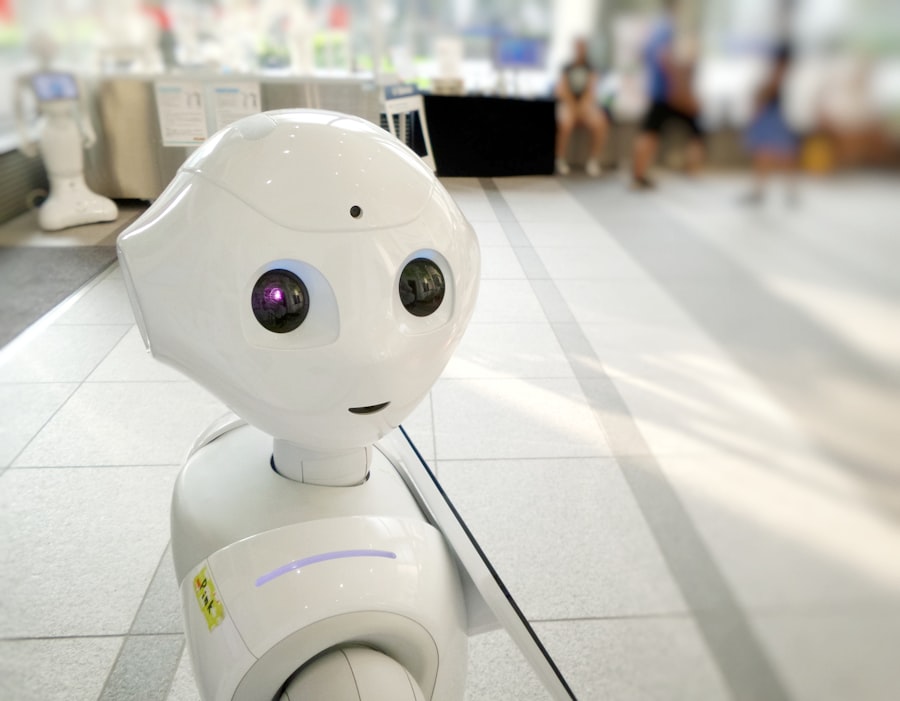The concept of smart factories represents a transformative shift in the manufacturing landscape, characterized by the integration of advanced technologies and data-driven processes. At the heart of this evolution lies the Internet of Things (IoT), which connects machines, systems, and people in a seamless network, enabling real-time data exchange and decision-making. This interconnectedness allows for greater efficiency, flexibility, and responsiveness in production processes, ultimately leading to enhanced productivity and reduced operational costs.
As industries grapple with increasing consumer demands and the need for rapid innovation, smart factories emerge as a beacon of progress, promising to redefine traditional manufacturing paradigms. Moreover, the rise of smart factories is not merely a technological advancement; it signifies a cultural shift within organizations. Manufacturers are increasingly adopting a mindset that embraces agility and continuous improvement, fostering an environment where data analytics and automation are leveraged to optimize operations.
This shift is driven by the necessity to remain competitive in a global market that is constantly evolving. As companies invest in smart factory technologies, they are not only enhancing their production capabilities but also reimagining their business models to align with the demands of a digital economy. The implications of this transformation extend beyond the factory floor, influencing supply chains, customer interactions, and overall business strategies.
Key Takeaways
- Smart factories are revolutionizing the manufacturing industry by integrating advanced technologies such as IoT, AI, and robotics to optimize production processes.
- The impact of smart factories on manufacturing includes increased efficiency, reduced downtime, improved quality control, and enhanced flexibility in production.
- Key technologies driving smart factories include Internet of Things (IoT), Artificial Intelligence (AI), robotics, 3D printing, and big data analytics.
- Manufacturers can benefit from smart factories through cost savings, improved productivity, better decision-making, enhanced safety, and reduced environmental impact.
- Challenges and barriers to implementing smart factory technology include high initial investment costs, cybersecurity concerns, workforce training, and interoperability issues.
The Impact of Smart Factories on Manufacturing
Transforming the Manufacturing Sector
The impact of smart factories on the manufacturing sector is profound and multifaceted. By harnessing the power of automation and data analytics, manufacturers can achieve unprecedented levels of efficiency and precision in their operations. For instance, predictive maintenance powered by IoT sensors can significantly reduce downtime by anticipating equipment failures before they occur.
Operational Efficiencies and Cost Savings
This proactive approach not only minimizes disruptions but also extends the lifespan of machinery, leading to substantial cost savings over time. Furthermore, smart factories enable manufacturers to implement just-in-time production strategies, allowing them to respond swiftly to market fluctuations and consumer preferences without overcommitting resources.
Reshaping the Workforce Landscape
As automation takes over repetitive tasks, there is a growing demand for skilled workers who can manage and interpret complex data systems. This shift necessitates a reevaluation of workforce training and development programs, emphasizing the importance of digital literacy and technical skills. Consequently, manufacturers are investing in upskilling their employees to ensure they can thrive in an increasingly automated environment.
A More Agile Workforce
The result is a more agile workforce that is better equipped to adapt to technological advancements and contribute to innovation within the organization.
Key Technologies Driving Smart Factories

Several key technologies are driving the evolution of smart factories, each playing a crucial role in enhancing manufacturing processes. One of the most significant advancements is the integration of artificial intelligence (AI) and machine learning algorithms into production systems. These technologies enable machines to learn from data patterns, optimize processes autonomously, and make informed decisions without human intervention.
For example, AI can analyze production data in real-time to identify inefficiencies or bottlenecks, allowing manufacturers to implement corrective measures swiftly. This level of intelligence not only streamlines operations but also enhances product quality by minimizing human error. Another pivotal technology is robotics, which has evolved from simple automation to sophisticated collaborative robots (cobots) that work alongside human operators.
These cobots are designed to assist workers in tasks that require precision and strength, thereby improving safety and productivity on the factory floor. Additionally, advanced robotics can be programmed to adapt to various tasks, making them versatile assets in dynamic manufacturing environments. Coupled with augmented reality (AR) and virtual reality (VR) technologies, manufacturers can provide immersive training experiences for employees, enabling them to familiarize themselves with complex machinery and processes without the risks associated with hands-on training.
Benefits of Smart Factories for Manufacturers
The benefits of adopting smart factory technologies are extensive and can significantly enhance a manufacturer’s competitive edge. One of the most notable advantages is increased operational efficiency. By leveraging real-time data analytics, manufacturers can optimize their production schedules, reduce waste, and improve resource allocation.
This heightened efficiency translates into faster production cycles and lower costs per unit, allowing companies to offer competitive pricing while maintaining healthy profit margins. Additionally, smart factories facilitate better inventory management through automated tracking systems that provide insights into stock levels and demand forecasts. Another critical benefit is enhanced product customization capabilities.
In today’s market, consumers increasingly seek personalized products tailored to their specific needs and preferences. Smart factories enable manufacturers to implement flexible production systems that can quickly adapt to changing customer demands without sacrificing quality or efficiency. This agility not only fosters customer loyalty but also opens new revenue streams through bespoke offerings.
Furthermore, the data collected from smart factory operations can inform product development processes, allowing manufacturers to innovate more effectively based on real-time feedback from customers and market trends.
Challenges and Barriers to Implementing Smart Factory Technology
Despite the numerous advantages associated with smart factories, several challenges and barriers hinder widespread implementation. One significant obstacle is the high initial investment required for upgrading existing infrastructure and integrating new technologies. Many manufacturers operate on tight margins and may be hesitant to allocate substantial resources toward digital transformation initiatives without clear short-term returns on investment.
This reluctance can stall progress and prevent organizations from reaping the long-term benefits that smart factories offer. Additionally, there is a pressing need for skilled personnel who can navigate the complexities of smart factory technologies. The rapid pace of technological advancement often outstrips the availability of trained workers capable of managing sophisticated systems such as AI and IoT devices.
This skills gap poses a significant challenge for manufacturers looking to implement smart factory solutions effectively. To address this issue, companies must invest in comprehensive training programs that equip their workforce with the necessary skills while fostering a culture of continuous learning and adaptation.
The Future of Manufacturing with Smart Factories

Data-Driven Decision Making
The increased reliance on data-driven insights will revolutionize the manufacturing industry. By leveraging advanced analytics and machine learning algorithms, manufacturers will be able to make informed decisions that drive business growth and improve operational efficiency.
Sustainability and Transparency
Moreover, as sustainability becomes an essential consideration for businesses worldwide, smart factories will play a pivotal role in optimizing resource usage and minimizing waste through intelligent production practices. Furthermore, the integration of blockchain technology into smart factories holds significant promise for enhancing supply chain transparency and security. By providing an immutable record of transactions and product provenance, blockchain can help manufacturers build trust with consumers while ensuring compliance with regulatory standards.
A New Era of Collaboration and Innovation
As these technologies converge, we can expect a new era of manufacturing characterized by unprecedented levels of collaboration between machines, humans, and supply chain partners. This interconnected ecosystem will not only drive efficiency but also foster innovation as organizations leverage collective insights to create value in ways previously unimaginable.
The Role of Smart Factories in Shaping the Future of Manufacturing
In conclusion, smart factories represent a pivotal development in the evolution of manufacturing, offering a myriad of benefits that extend beyond mere operational efficiencies. By embracing advanced technologies such as AI, IoT, robotics, and blockchain, manufacturers are not only enhancing their production capabilities but also redefining their business models in response to an ever-changing market landscape. The journey toward becoming a smart factory may be fraught with challenges; however, those who successfully navigate this transition will emerge as leaders in their respective industries.
As we look toward the future, it is clear that smart factories will play an integral role in shaping the manufacturing sector’s trajectory. The ability to harness data-driven insights for informed decision-making will empower organizations to innovate continuously while meeting consumer demands for customization and sustainability. Ultimately, smart factories are not just about technology; they represent a holistic approach to manufacturing that prioritizes agility, collaboration, and resilience in an increasingly complex world.
As such, they will undoubtedly be at the forefront of driving progress in manufacturing for years to come.
In exploring the future of manufacturing, it’s essential to consider the role of emerging technologies in shaping smart factories. A related article that delves into this topic can be found on Wired.com, as highlighted by ENICOMP. This article discusses how innovations such as AI, IoT, and robotics are not only enhancing production efficiency but also transforming the entire manufacturing landscape. For a deeper understanding of how these technologies are being integrated into modern manufacturing processes and their potential impacts, you can read more about it here.
FAQs
What is a smart factory?
A smart factory is a highly digitized and connected production facility that uses technologies such as artificial intelligence, machine learning, internet of things (IoT), and robotics to improve manufacturing processes and efficiency.
How will smart factories shape the future of manufacturing?
Smart factories will revolutionize manufacturing by increasing productivity, reducing costs, improving quality, and enabling more flexible and customized production. They will also lead to the creation of new job roles focused on managing and maintaining advanced technologies.
What are the key technologies used in smart factories?
Key technologies used in smart factories include IoT sensors for data collection, artificial intelligence for predictive maintenance and quality control, robotics for automation, and cloud computing for data storage and analysis.
What are the benefits of smart factories?
The benefits of smart factories include increased productivity, reduced downtime, improved quality control, lower operational costs, and the ability to quickly adapt to changing market demands.
What are the challenges of implementing smart factories?
Challenges of implementing smart factories include high initial investment costs, the need for skilled workers to operate and maintain advanced technologies, and concerns about data security and privacy.

